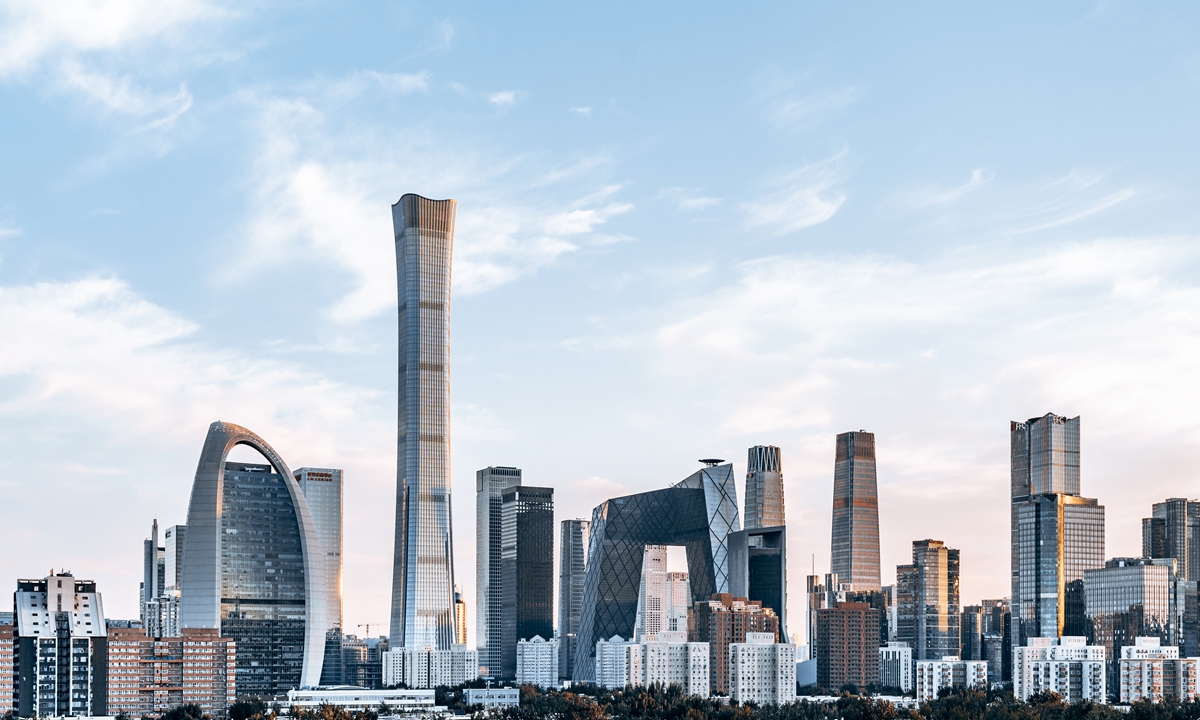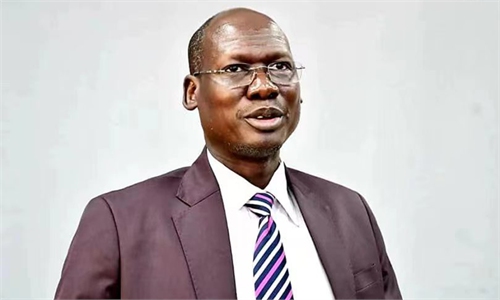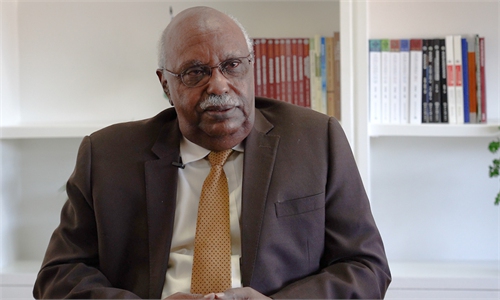
A scene of Beijing Photo: VCG
Editor's Note:For Chinese people, the past decade has been epic and inspirational. The country, under the leadership of the Communist Party of China (CPC) Central Committee with Comrade Xi Jinping at the core, has made great endeavors in boosting its economy, deepening reforms, improving the rights of its people and acting as a responsible global power.
Mikaela Nhondo Erskog, a researcher of the Tricontinental: Institute for Social Research who co-hosts The Crane: An Africa-China Podcast, told the Global Times reporter Yu Jincui that Africa should see China as an important source of inspiration in the fight to eradicate absolute poverty and China's rise has made Africans have "options," as opposed to the previous "Western option."
This is the 31st article of the Global Times series about this special decade.
GT: What inspiration does China's pursuit of Chinese modernization offer to developing countries, especially African countries, in exploring a modernization path that suits their own national conditions?
Erskog: Africa should see China as an important source of inspiration in the fight to eradicate absolute poverty. China has made significant steps with 98 million rural residents having been lifted out of absolute poverty. For us, on a continent where poverty is endemic, where at least 1 in 3 Africans live below the poverty line despite inhabiting a continent with the largest amounts of precious minerals, metals, and natural wealth, drawing lessons from the CPC's leadership in these processes is of utmost importance in our pursuit of self-determination and development.
In addition, the fact that China, not so long ago, was one of the poorest countries in the world and has in the time of just over 70 years managed to become a leading economy in the world with a unique political model and an alternative ideological perspective from the Western hegemonic one offers up hope that another path is possible for us too.
GT: How do you see the prospect of building a China-Africa community with a shared future?
Erskog: Though there may be many cultural, social, and economic differences between the African and Chinese people, we share a lot of common values and common histories of peoples' struggles against domination and exploitation. With recent developments, the destinies of our peoples have become increasingly more intertwined and, therefore, our collective survival and advancement demand us to recognize and construct a shared future. With the current planetary crisis unfolding, there will be no future if it is not shared.
In terms of Africa's pursuit of dignity and sovereignty, there is greater hope for that today due to the opening of new vistas and possibilities enabled by the material, economic and political developments we have seen from the Africa-China relationship. The Chinese government deals with African governments regardless of the political limitations African governments may have with regard to the people. A shared future is largely dependent on how African peoples' movements organize within our respective nations and regions to better leverage the populations' interests and construct more democratic, people-centered processes, in contexts where our governments have not held the interests of its people at the forefront.
We see the good faith shown in activities like the Chinese foreign minister visiting Africa first every year or the agreements from FOCAC in the last 22 years, we have ways to go in building consensus over shared objectives and the paths towards those objectives, and ways to go in building our capacity to stand as equals alongside the international community. A shared future can only be built if we come to collective understandings based on principles and actions of international solidarity. Mozambican national liberation leader Samora Machel said it best: 'International solidarity is not an act of charity: It is an act of unity between allies fighting on different terrains toward the same objective.' This requires conditions to be produced where African people can define, advocate for and build our continental project, whilst co-constructing mutually beneficial processes with the peoples of China.
GT: Can you briefly introduce your podcast The Crane: An Africa-China Podcast? What is your original intention and purpose to start this podcast?
Erskog: We began this podcast hoping to provide a fresh look at the news, events, and debates around Africa-China relations from the perspective of two young(-ish) Africans who care deeply about the social advancement of Africa's 1.3 billion people.
From historical and contemporary Africa-China relations, to unmasking some of the controversies and complexities, we want to understand not only what's going on but also what's at stake in Africa-China relations today.
We decided to do this because the reality, particularly over the last three years, has been that, on the African continent and globally, there seemed to be an extreme level of misunderstanding about and hostility toward China, particularly since the Trump administration's increasing belligerent political and economic policies in 2018-19 and the polarization it generated. This has deepened historical Sinophobia and anti-Communism in the West that only worsened in the early months of the COVID-19 pandemic in 2020.
Western-dominated media (that is very influential on the continent) was and continues to push a lot of myths and misinformation, or present a monolithic, disingenuous depiction of China, its people, politics and society. Whilst doing so, Africans are either addressed in a patronizing fashion or left out of the conversation, as though we know nothing about our own realities.
When Africans are given a platform, it's left to NGOs, government officials, so-called experts and think tanks that drive an elitist agenda or hold a deep anti-Communist sentiment. We, as people who work with social movements and peoples' organizations, see a vacuum in the discourse where the agency of our people and our continent's socio-economic and political advancement is not focused on, nor is there any attempt to envision an economic model that does not replicate capitalism.
Despite having made fascinating, groundbreaking advancements that hold great potential for the whole advancement of humanity - from the developments in science and technology to lifting over 800 million people out of extreme poverty in the last four decades - there seems to be a persistent unwillingness to understand the complexities of China's development and the nation's engagement with the world. With the world teetering on the brink of environmental, economic and political collapse, it is irrational to pursue division and discord, when the current moment demands collaboration and cooperation.
GT: The Crane podcast you co-host has seen steadily increasing audience since its launch. Why can it gain increasing popularity? What's the difference between your podcast's interpretation of China-Africa relations different and that from a Western perspective?
Erskog: We are young, anti-capitalist and anti-imperialist Africans who are politically committed to raising consciousness and advancing the projects of the working-class organizations in our continent, closely committed to people's struggles for sovereignty, continental unity and advancement.
Our perspective differs because we approach the Africa-China relationship through an understanding of the current correlations of forces being one that has favoured the descendants of Western colonialism and the new pundits of Western imperialism that do not have the interest of African people at heart, but rather seek to maintain the unipolar world order that thrives on the exploitation of our people's lands, resources and labour.
We are under no illusion that China has its priorities that may come into conflict with some of those of the African people. However, in the bigger picture, the rise of China's economic, political, and technological prowess and influence on the global stage has shifted the correlation of forces in such a way that Africans now have options (plural), as opposed to the previous Western option (singular).
China's advancements and, in particular, the shift away from unipolarity that has come with it have put Africa on a totally different footing, in a way that suggests that we in Africa could have a very different trajectory from the one set out by our long history of colonization and decolonisation that has bred poverty and deepened inequality.
The African continent, which previously was entirely beholden to the politics and markets of our former colonizers who maintained a hegemonic role over the development agenda of Africa, now has options, choices and more space to leverage our natural resources and human capacities in ways that can benefit our people and strengthen our sovereignty.
GT: One episode of your podcast was themed China deepens Africa trade ties while US plays geopolitics. The US revealed a new strategy for sub-Saharan Africa designed to forge closer economic, political and security ties with countries in the region, vowing to provide more assistance and support. How do you evaluate the strategy?
Erskog: Economically, China is now the world's second largest economy, although it is the largest once purchasing power is taken into account. The US has become increasingly concerned about China's faster economic growth. Politically, the Biden administration has been disappointed that Africans have refused to join the US-led effort to isolate Russia over its invasion of Ukraine, and the general lack of interest of African leaders to stoke the flames of a new US-led Cold War against China. This is the context in which Blinken's trip to Africa in August took place, clearly an effort to cajole African leaders to side with the US in the 'great power competition' that the US is leading.
In a study my organization Tricontinental: Institute for Social Research published in July last year, it became clear that under the banner of diplomacy and security support, a core mandate of US military apparatus on the continent is securing economic interests, and aims to thwart and push back against China's growing influence in Africa. As Chinese private and public commercial interests have increased on the African continent, and as Chinese firms have consistently outbid Western firms, US pressure to contain China on the continent has increased. Reports from the US military routinely sketch out the responsibility of its range of armed forces to ensure a steady stream of raw materials for corporations - especially energy - and to maintain unimpeded movement of goods through shipping channels. Such reports include National Energy Policy (May 2001) from the National Energy Policy Development Group, led by former Vice President Dick Cheney, and Assessing and Strengthening the Manufacturing and Defense Industrial Base and Supply Chain Resiliency of the United States (September 2018) from the Interagency Task Force in Fulfilment of Executive Order 13806. In this sense, the US military - alongside its NATO partners - operates as the gendarme not for the world community, but for its own commercial and geopolitical interests.
It is therefore no surprise that, despite rhetorical declarations from Blinken that Africans should be able to choose who they work with and how they work with them, the policy documents say otherwise. The new policy document, US Strategy Toward Sub-Saharan Africa, frames US engagement in Africa, though indirectly, through its geopolitical imperatives to subdue Russia and China, rather than offer concrete proposals around activities that could advance our continent's development. The document describes China's engagement as "an important arena to challenge the rules-based international order, advance its own narrow commercial and geopolitical interests, undermine transparency and openness, and weaken US relations with African peoples and governments" and the US centers much of its activity in militaristic terms, such as when it says that, "in line with the 2022 National Defense Strategy, the Department of Defense will engage with African partners to expose and highlight the risks of negative PRC and Russian activities in Africa."
This should be of serious concern to Africans, where the US, with at least 29 military bases on the continent, now looks like it is instrumentalizing the continent as a buffer zone for its geopolitical rivals in the Maghreb and Asia. As President of Senegal and African Union Chairperson, Macky Sall explained at the 77th United Nations General Assembly in September 2022, 'Africa has suffered enough of the burden of history, that it does not want to be the breeding ground of a new Cold War, but rather a pole of stability and opportunity open to all its partners, on a mutually beneficial basis.'


